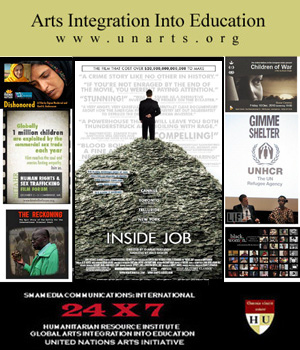Related UN
Contingency Discussions:
-----------------------------------------------------------------------
13 April 2011
From: Stephen M. Apatow
Founder, Director of Research & Development
Humanitarian Resource Institute
Humanitarian University Consortium Graduate Studies
Center for Medicine, Veterinary Medicine & Law
Phone: 203-668-0282
Email: s.m.apatow@humanitarian.net
Internet: www.humanitarian.net
To: Human Rights Council and Treaties Division
Complaint Procedure
OHCHR-UNOG
1211 Geneva 10, Switzerland
Fax: (41 22) 917 90 11
E-mail: CP@ohchr.org

Subject: Financial Crimes Referred to UN Commission on Human Rights
- Security Council
The global economy has been devastated, by activities classified as
financial crimes, [1] specifically the unregulated shadow banking
system [2] and OTC derivatives market. [3]
The legislative repeal of Glass-Steagall in 1999
[4] and the Commodities Futures Modernization Act of 2000 [5] are
considered to be key vehicles that facilitated global deregulation of
the OTC derivatives market and shadow banking system from 1999 through
2008. The Glass-Steagall Act, that was enacted during the Great
Depression Era to specifically stop access to the reserve bank window by investment banks, is viewed to be a direct cause of the crisis.
In 1999, this legal protection was removed, facilitating
geosystemic damage through speculative trading.
In 2008, emergency actions associated with the collapse of the global
financial system, did not include the restoration of the Glass-Steagall
legal protections. The OTC derivatives market and shadow banking system
was allowed to remain intact and central banks flooded the global
financial system with zero interest rate emergency central bank loans.
These emergency loans flowed directly into investment banks that
leveraged
the stock and commodity markets, facilitating a recovery of the stock
market, but a deeper humanitarian emergency associated with with
hyperinflation
and an oil/food crisis that has destabilized the continent of Africa
and
the entire Middle East.
The PBS documentary entitled "The Warning" [6] outlines the historical
events associated with these critical legislative actions in the United
States that facilitated global market integration.
The Academy Award Winning Documentary "The Inside Job" [7]
addresses the scope of this crisis in greater detail, see:
Efforts to address this economic crisis through
contingency discussions on the UN and International Bar Association
level have failed, prompting the call for legal review of available
evidence by the UN Commission on Human Rights and
Security Council. It is critical that emergency actions
are coordinated to stabilize the global financial system and
humanitarian emergency that continues to spiral out of control.
This includes the development of legal tools to (1) assist restructure under bankruptcy protection for all
UN member countries, (2) address market distortions associated with the
unregulated global OTC derivatives market and shadow banking system,
(3)
debt relief proportional to resultant damage and (4) emergency
humanitarian
assistance for impacted populations.
References:
1. Financial Crimes: Mortgage Fraud - OTC
Derivatives: Humanitarian Resource Institute, 27 April 2010. Url:
www.unarts.org/news/afinc_4282010.html
2. Shadow Banking: Federal Reserve Bank of New York Staff Reports, July
2010. Url: www.newyorkfed.org/research/staff_reports/sr458.pdf
3. The Structure of OTC Derivatives Markets: Randall Dodd, Derivatives
Study Center. The Financier • VOL. 9, NOS. 1-4, 2002 Url:
www.financialpolicy.org/dscotcstructure.pdf
4. The repeal of the Glass-Steagall Act in 1999: Wickpedia: Url:
www.en.wikipedia.org/wiki/Glass%E2%80%93Steagall_Act
5. The Commodity Futures Modernization Act of 2000: Wickpedia: Url:
www.en.wikipedia.org/wiki/Commodity_Futures_Modernization_Act_of_2000
6. The Warning - FRONTLINE - PBS:
Url: www.pbs.org/wgbh/pages/frontline/warning/
7. The Inside Job: 2010 Academy Award Film, narrated by Matt Damon.
Url: www.theinsidejobfilm.com
|